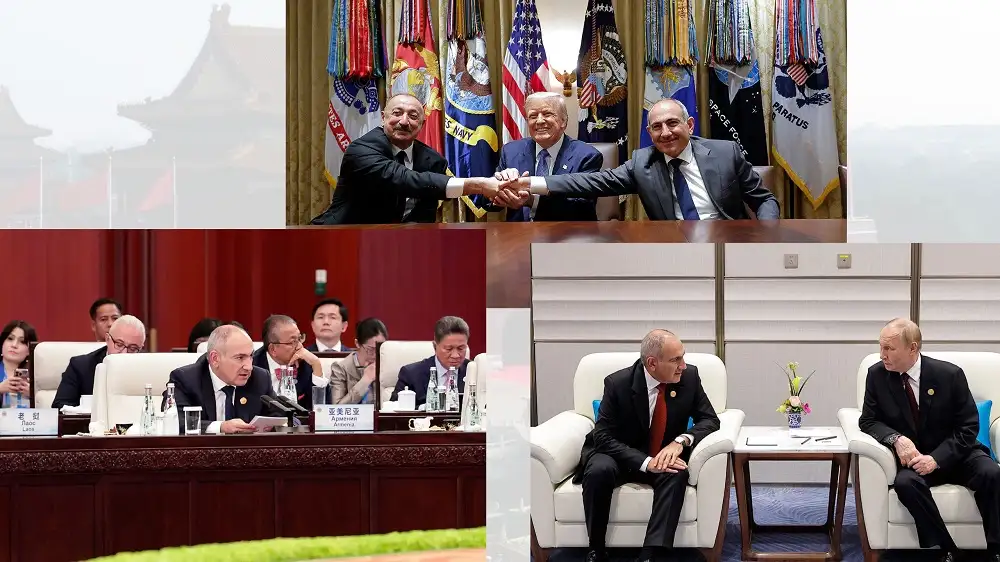Just days after the signing of the Armenian-Azerbaijani peace agreement in Washington with the participation of President Trump and the approval of transport infrastructure projects with American investments in the South Caucasus, Armenian Prime Minister Nikol Pashinyan is leaving for China to participate in the summit of the Shanghai Cooperation Organization (SCO). A platform that genuinely seeks to limit US global dominance and foster a multipolar world order.
In Beijing, the Prime Minister also participates in the jubilee and large-scale military parade dedicated to the 80th anniversary of China's victory over Japan in World War II, and then travels to Japan to attend high-level meetings and ceremonies.
Demonstration of Independence
At first glance, this foreign diplomatic movement does not fit into the general "logical" chain. However, this contradiction does not seem to have raised questions in Washington: at least, publicly and, at least, for the moment. These steps of Yerevan are at least understandable for Washington. This is remarkable, taking into account, for example, Trump's sharp reaction to the warm handshakes of Russian President Putin and North Korean President Kim Jong-un within the framework of the same SCO and the fact that he qualified this as a demonstration of conspiracy against the United States. In Washington, they could not remain indifferent to the warm contacts between the leaders of Russia, China, and India, which were not accidentally presented as a sign of the unification of the bear, dragon, and elephant against the American eagle. And in Tokyo, based on the emphasized high, dignified level of reception shown to the Prime Minister, it seems that Pashinyan's participation in the Beijing military parade, which was nothing more than, if not, a "show of Chinese muscles" in front of not only the United States, but also Japan, did not raise any questions.
Official Yerevan, in fact, is trying to demonstrate its lack of dependence on geopolitical centers and complete independence of actions. Armenia is thus attempting to explain that, although its civilizational orientation is towards Europe, it retains room for maneuver at a lower, political level.
Understanding is a guarantee of credibility.
In the current period of global tectonic shifts, such a diplomatic approach allows the country to avoid branding itself as part of one camp or another, which can neutralize some challenges. However, on the other hand, this is a tactic of walking on a razor's edge, in which any slip can have fatal consequences.
In this case, the fulcrum becomes sufficient frankness with all partners, who are treated equally, firstly, so that everyone understands what to expect from Armenia, and secondly, how much to trust it. Otherwise, for example, it is incomprehensible how Armenia can sign a strategic partnership charter with the US within a year, with a difference of several months, and then sign a declaration of the same level of cooperation with China, when the new US administration has now directed its entire customs and technological policy to halt China's economic and geopolitical development.
Similarly, in the absence of sufficient sincerity, it is unclear to Europeans how a country can enshrine its desire to join the EU in law and then submit an application for membership in the SCO, which has a different economic system. In the latter case, of course, one gets the impression that Yerevan took this step precisely with the expectation of rejection, purely to emphasize its desire to strengthen its relations with China. However, regardless of this, such a policy requires a high degree of caution, foresight, and calculation from Armenia.
How not to isolate yourself with the expected open borders...
Despite this, Armenia cannot remain uninvolved in the economic and political processes taking place around China in the East, especially if it considers the prospect of its lifting of the blockade, opening of communications, and the implementation of its "Crossroads of Peace" concept to be realistic in the near future. Ignoring the Eastern direction will mean continuing to remain uninvolved in the large-scale trade, economic, and communication projects persistently promoted by China, and in part related to the South Caucasus region, leaving the role of their regional addressee to Azerbaijan. In other words, in the new multipolar reality, the wide-open multipolar diplomacy has no alternative for Armenia. It remains to make no mistakes in the calculations of taking steps.
Gor Abrahamyan


















